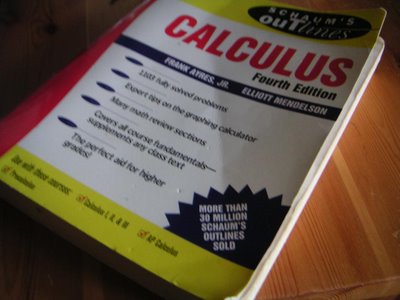Holiday Reading

Yes, pretty uncool. But actually more interesting than it looks.
I'm off to Portugal with my family, and will be taking the opportunity to work through this book. Not all the time of course- I'm also taking things like Harry Potter and the Order of the Phoenix* and maybe North and South, which I've been meaning to read for a few years. Holidays are a good time for books that start off slow, because without easier ones to pick up instead you're forced to get past the difficult bit, and they're generally then pretty engrossing. Though of course there are exceptions. I'll probably also take L'Empire des Livres which I got a third of the way through before lending it to a friend (not quite sure why I didn't wait till finishing it) and recently got back. Then maybe two more that I haven't chosen yet.
But back to Calculus. Why am I taking a textbook on holiday? (Am I mad?) Well, I have a horrible secret, which is that in spite of achieving a good grade in my undergraduate maths degree, I can't do integration, or really any Methods from Further Maths A-level on (that's why I didn't get an A- though the overall grade was B, the Further Maths parts were a C and a D). For those (probably most of you) who are wondering what integration and Methods are: I won't go into integration here, but suffice it to say that it's something you'd expect anyone with a place on a maths degree, let alone a maths graduate, would be able to do; I have difficulty with it because I can never work out which of the four or so techniques to use (mostly you need a different one for each problem), and with the substitution method I never know what to substitute. Methods is basically what gets called Pure Maths at A-level; it's considered applied maths at university and most people find it much easier than university pure maths; I had to be different.
None of this would matter that much, what with having got my degree and all, except that I have a nasty feeling that the masters is going to involve using Methods a lot in order to solve equations once the statistical principles have been applied. I have frightening visions of me mid-course having triumphantly worked out what bit of statistics to use and then feeling like a bucket of cold water has been thrown over me when I see that I am now confronting a, to me, impossible integral. It seems to make sense to try and get over this Methods block now, rather than having to spend ages at that point trying to remember the stuff I've been taught about integration and then struggling to put it into practice. In any case, I'm not generally a person who's happy with 'can't' as a state of affairs- if I can't do something my first reaction is to try and learn how.**
So I dug out this textbook, which was the set book for a course covering only the material in its last few chapters, but which actually starts with the basics and goes over integration and other usefull stuff right from the beginning. Like all the other books I've come across in the same series, Schaum's Outlines, it has easy to follow explainations (not a lot of proof, which university courses would always include, and which I would want- but as I've covered all the material before I'm now happy just to understand it), and lots of questions, all with answers and quite a few with detailed solutions, so if I don't know how to do a problem I can learn for the next time. And actually, when I get working on it, it is pretty interesting (though I wouldn't want to spend the whole holiday on it!)- untill I come upon something I can't do, when it's just scary! But I'm hoping there won't be much of that.
*Rule No. 1 of being a student: you must develop, or re-develop, a passion for children's books and TV programmes (though I suppose Harry Potter really counts as mainstream). Incidentally, I have Issues with J K Rowling's literary abilities, but it would take too long to go into them here. (See, I am becoming more concise!)
**(This wasn't the case untill about the age of 15- up to then I just happily accepted that I was bad at art, crafts, sport and music, because I was good at enough academic subjects and I felt it had to all balance out- and anyway, I'd been given the impression that you either had it or you didn't with most non-academic subjects- if you had it you'd already know how to do everything without being taught and if you didn't no teaching could help you to improve. My epiphany came too late for sport and music (and in any case I'm not convinced even trying my hardest with those would get me anywhere), but when I suddenly understood that I wasn't putting the effort and the willingness to learn into art and crafts, and corrected that, I did show quite an improvement, and although I was still not that great an artist, I found that I was pretty good at crafts.


2 Comments:
Thanks for stopping by my blog. I thought I'd return the favor.
And I have to say, I think you're brave. I never made it past pre-calc in maths, although there was a horrible class on statistics with a Chinese professor . . . . Good luck with your practice studies!
Thanks!
Post a Comment
<< Home